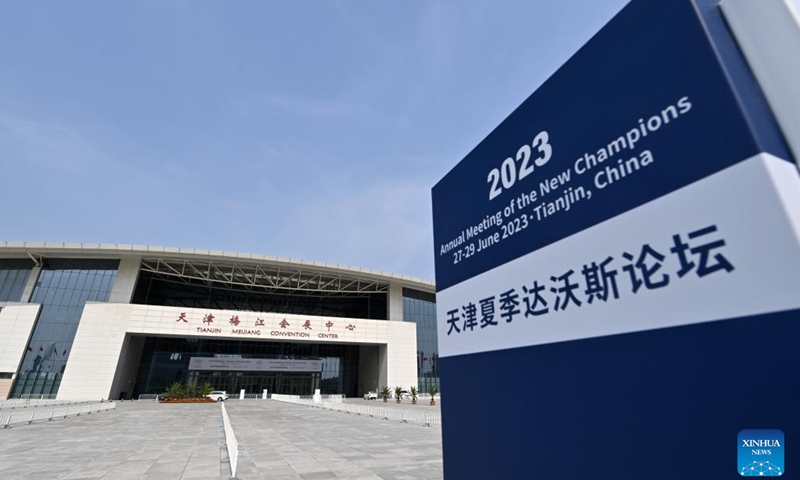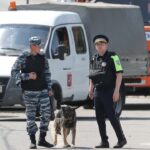About 1,500 participants from business, government, civil society, international organizations and academia are to gather in North China’s Tianjin for the World Economic Forum’s (WEF) 14th Annual Meeting of the New Champions (AMNC), also known as Summer Davos, after a three-year hiatus of the in-person event due to the COVID-19 pandemic.
As global attendees on Monday share their excitement of getting together again face-to-face and expectations of the opportunities the forum could bring about, observers stressed the importance of this kind of occasion in providing a platform for political and business leaders to have dialogue and renewing momentum for innovation and entrepreneurship to drive growth and a more equitable, sustainable and resilient global economy.
This year’s forum, held from Tuesday to Thursday, can help participants gain a deeper understanding of China’s economic performance and high-standard opening-up, and also heralds China’s role as an engine of global recovery and growth, and an anchor of economic stability and globalization against the backdrop of looming recession risks and noises calling for “decoupling” and “de-risking.”
Chinese Premier Li Qiang will attend the opening ceremony and deliver a keynote speech on Tuesday.
During a Monday meeting with Founder and Executive Chairman of the WEF Klaus Schwab in Tianjin, Li said the world economy has undergone globalization and becomes intertwined.
Cooperation between countries and developing complementary advantages are requirements for the development of productive forces and an irreversible historical trend. Countries should enhance mutual understanding and trust, reduce misjudgment, adhere to mutual benefit and win-win results, strengthen integration of interests, work together to overcome common challenges, and create a better future, Li said.
China will adhere to the path of peaceful development, firmly expand high-level opening-up, and is willing to work with all parties to continue to build an open world economy and promote the building of a community with a shared future for mankind, Li said.
Li on Monday also met with visiting Vietnamese Prime Minister Pham Minh Chinh in Beijing, who will also attend the Summer Davos.
Together again
A feeling of excitement can be felt upon arrival in Tianjin, as the taxi driver at the high-speed railway station warmly introduced the city’s views and culture to travelers, many of whom were coming to attend the Summer Davos.
Billboards and posters advertising the forum can be seen at the railway station and along the main avenues around the conference venue, the Tianjin Meijiang Convention and Exhibition Center.
Roads in the city center were cleaned by pressure hose as Tianjin looks to present its best image in front of so many international guests, who have not come together in such a manner for four years, the Global Times learned.
Face-to-face interaction is irreplaceably good for people to address common issues faced by the world, attendees told the Global Times on Monday at the registration center, which has been busy all day.
Niall Murphy, CEO of Switzerland-based Kubu Ventures, told the Global Times that he had just landed in China for a couple of hours and it has been a thrilling experience to visit the country again after four years.
“Whenever I come to China, it’s always very impressive. There’s a lot of development. I passed through Shanghai to Tianjin… and I can see lots of industry going on,” Murphy said.
Since the 13th AMNC in Dalian, Northeast China’s Liaoning Province in 2019, the past four years have witnessed tremendous challenges, including the global health crisis, inflation and economic recession, “decoupling” attempts by some countries and food and energy crises each taking its toll on global growth.
“It’s going to be about a post-pandemic environment, about how we are responding to other challenges, like climate change and so on, as well as the economic challenges that the world’s facing,” Murphy said.
In this regard, Murphy said he is very interested in what the thinking (of his Chinese colleagues) is and what people are focused on in terms of innovation.
As 2023 is the first really post-pandemic year, the trajectory of global recovery remains uncertain, some participants said.
Recalling discussions she had back in 2019, Wan Zhe, a participant of the Summer Davos and a professor at the Belt and Road School at the Beijing Normal University, said the world is facing completely different challenges today.
“It is a great occasion to have a global event after the pandemic in which business and political circles can engage in face-to-face talks. To reflect on common experiences and get connected is very important for us to jointly face up to the challenges,” Wan said.
Bai Ming, a research fellow at the Chinese Academy of International Trade and Economic Cooperation in Beijing, told the Global Times that the global economic recovery is sluggish, geopolitical tensions are intensifying, and the US Fed’s interest rate hikes have pushed up financial risks.
Under such circumstances, global economies need to strengthen cooperation, reduce barriers, and form a joint force for development, Bai said.
WEF Greater China chairman Chen Liming, in an interview with People’s Daily published on Saturday, warned against attempts by some Western countries to push for “decoupling” under the disguise of “de-risking” rhetoric.
Trade wars, tariffs or economic sanctions cannot benefit the countries involved but will only hurt companies, some from the countries that initiated those restrictive and hostile policies, Chen said. “We are glad to see that China-US relations have recently shown signs of easing, with repeated signals of dialogue and cooperation.”
Inject confidence, positivity
Sessions of this year’s Summer Davos will address the latest issues on the global agenda – global debt explosion, financial stability, climate action – with systemic relevance for Asia and the rest of the world, as well as the latest innovative technologies with the potential to transform the world, such as generative AI, plant sensors, care tech, batteries and EVs.
More than 25 initiatives will be launched or advanced at the AMNC, serving as platforms for ongoing collaboration, according to WEF’s official website.
As the world’s second largest economy and a major trading partner with 140 countries globally, China’s economy has a pivotal position in the world, and the consumption of goods and services will also have a spillover effect on neighboring countries, Chen said.
China will contribute 34.9 percent of the global growth in 2023, per International Monetary Fund forecasts in May. The Asia-Pacific region as a whole is projected to drive about 70 percent of global international economic growth, increasing its presence as Western growth slows.
China’s three major economic indexes saw stable growth in May, with industrial output rising 3.5 percent year-on-year and social retail sales expanding 12.7 percent year-on-year, defying claims that its economy is “losing steam”. China’s economy has shown great resilience and potential, and the rebounding of consumption during the Dragon Boat Festival added to this confidence.
Bai noted that the Summer Davos is a window for the world to understand China, and also a platform for countries to exchange views and seek cooperation.
Through Summer Davos, China will present its voice, contribute its wisdom, and find out the greatest common interest to promote the development of the world economy, Bai said.
Zhao Juecheng contributed to the story













